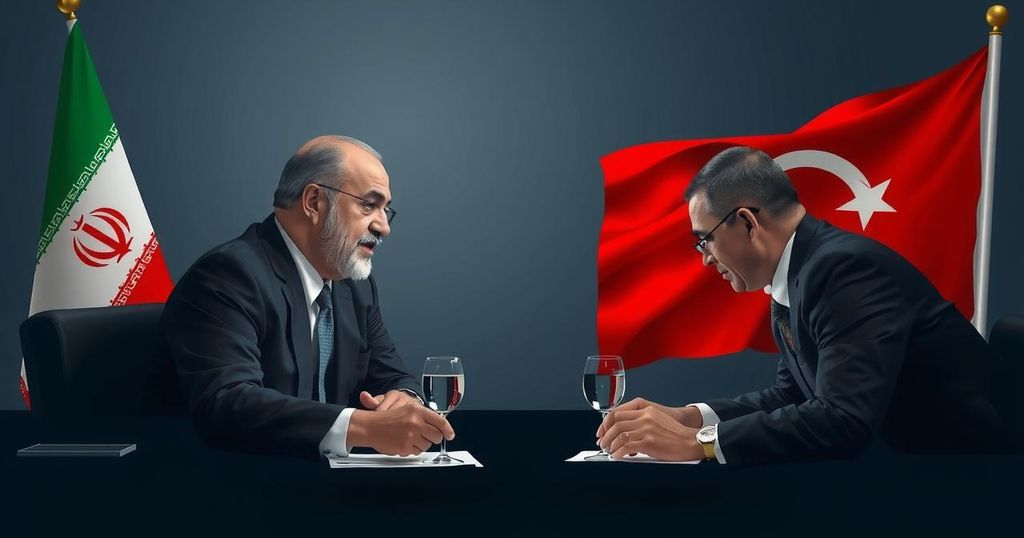Iran’s Foreign Minister Abbas Araghchi visited Turkey, accusing it of supporting rebels in Aleppo. Instead of diplomatic proposals from Assad, he voiced Iran’s grievances. Turkey’s Foreign Minister Fidan refuted claims of support to rebels, emphasizing Assad’s failures in negotiation. Local and international dynamics complicate the ongoing crisis, with potential discussions planned between Iran, Turkey, and Russia.
During Iranian Foreign Minister Abbas Araghchi’s recent visit to Turkey, tensions escalated as he accused Turkey of facilitating a rebel offensive aimed at capturing Aleppo from the Syrian government. This diplomatic mission followed Araghchi’s meeting with Syrian President Bashar al-Assad, during which he reaffirmed Iran’s unyielding support for Damascus. Contrary to expectations that he would deliver Assad’s proposals for a peaceful resolution, Araghchi instead voiced Iran’s concerns, claiming Turkey had betrayed Iran’s trust by allegedly backing the rebels. He further escalated the rhetoric by suggesting that Iran might consider deploying troops to Syria if requested by Damascus.
Turkish officials, however, firmly denied any support for Syrian opposition groups. Turkish Foreign Minister Hakan Fidan responded sharply to Araghchi, contending that both Assad and Iran, which does not border Syria, have not adequately engaged in peace negotiations. He admonished Iran for seeking scapegoats and suggested that neglecting the demands of the Syrian opposition and failing to commit to a political dialogue were significant oversights that exacerbated the civil conflict.
After their discussions, Fidan emphasized that linking the violence in Aleppo to foreign interference was misguided, stating, “This is a mistake and a refuge for those unwilling to understand the realities in Syria.” He acknowledged the ongoing civilian attacks that have reignited warfare and reiterated Turkey’s readiness to facilitate constructive dialogue between the Assad government and opposition factions. Araghchi proposed a meeting involving Turkey, Iran, and Russia’s foreign ministers amidst the upcoming Doha Forum in Qatar, although he did not present new strategies or proposals for resolution. Turkish President Recep Tayyip Erdogan reiterated Turkey’s commitment to a peaceful resolution during a call with Iraqi officials, urging the Syrian regime to engage in genuine political discourse to prevent further deterioration of the situation.
The recent diplomatic exchange between Iran and Turkey reflects ongoing regional tensions surrounding the Syrian Civil War. As various factions vie for power, the roles of Iran and Turkey have become increasingly contentious, with Iran supporting the Assad regime and Turkey advocating for opposition elements. The conflict has led to significant international scrutiny and diplomatic negotiations among key players, including Russia and Iraq. This context sets the stage for the current disputes between Iran and Turkey, particularly given the rising violence in Aleppo, a strategic location for both rebel and government forces.
In summary, the visit of Iranian Foreign Minister Abbas Araghchi to Turkey exemplified the rising tensions and complex dynamics surrounding the Syrian conflict. Instead of delivering a diplomatic overture from President Assad, Araghchi’s accusations against Turkey highlighted deep grievances and distrust between the nations. Turkish officials countered by emphasizing their efforts towards facilitating peace negotiations and called for both the Assad regime and Iran to engage meaningfully. The situation continues to evolve, with potential diplomatic dialogues on the horizon, reflecting the urgent need for resolution in the protracted conflict.
Original Source: www.middleeasteye.net







